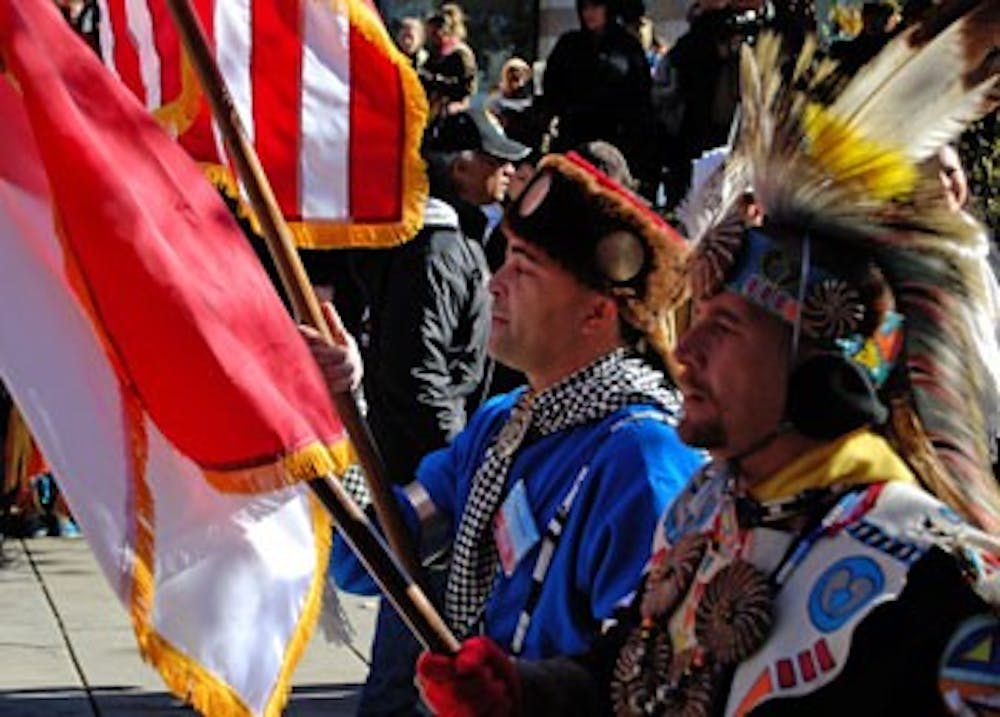Due to a reporting error in this story the process for federal recognition of American Indian tribes is incorrectly explained. Tribes must go through the Bureau of Indian Affairs process for federal recognition. The Lumbee tribe is currently seeking a congressional act for recognition because an earlier federal bill denied it making it impossible to go through the Bureau of Indian Affairs process.
In the same story the caption with the photo incorrectly identified the group photographed. The dancers are the Stoney Creek drum group.
The Daily Tar Heel apologizes for the errors.
The oldest population presence in state history is today struggling with some very contemporary challenges.
November is American Indian Heritage Month in North Carolina and President Bush declared Friday Native American Heritage Day. The recognition brings attention to a population that remains a distinct entity" despite thousands of years residing on N.C. land.
""We have to continue to address the problems of lack of inclusion in the policy making process"" said Greg Richardson, executive director of the N.C. Commission of Indian Affairs, which works to preserve cultural identity and advocate for the rights of American Indians.
We still have to deal with the problem of racism.""
According to the 2000 Census" about 100000 American Indians live in North Carolina — the largest population east of the Mississippi and the eighth-largest population in the country.
Tribes face the same challenges as any other American demographic although they retain some autonomy from the U.S. government. Some of the problems such as education and health care are exacerbated by a lack of government funding.
New faces in political office could usher in changes Richardson said.
He said he is hopeful that President-elect Barack Obama and N.C. Governor-elect Bev Perdue will appoint American Indians to their administrations.
North Carolina has eight tribes that are either state or federally recognized. The largest non-federally recognized tribe is the Lumbee Tribe based in Robeson County.
Tribes want federal recognition because with that comes funding from the federal Bureau of Indian Affairs and the right to operate gaming facilities on tribal land.
Gaming is a lucrative industry for American Indians that provides revenue and creates jobs for tribe members.
Many of the problems American Indians face stem from how much money the tribes receive from the federal and state governments.
The Eastern Band of Cherokee are the only federally recognized tribe in the state. They operate a gaming facility in Cherokee located in the western edge of North Carolina. The facility has become the largest employer in the western part of the state.
Federal recognition requires a U.S. Congressional act and is something that the Lumbee Tribe has long been advocating for.
Sen. Elizabeth Dole R-N.C. tried to pass the most recent Lumbee recognition bill last year but failed because of significant opposition from other states.
One of the biggest challenges for American Indians today is education — only a little more than half graduate from high school said Clara Sue Kidwell director of the American Indian Center at UNC-Chapel Hill.
This is in large part because of low funding for schools in areas populated by American Indians she said.
Organizations such as the intertribal Wake County Indian Education Program offer tutoring services for American Indian students who are at risk for dropping out and are struggling to fit in said coordinator Gwen Locklear.
Many tribes have trouble accessing adequate health care also in large part due to a lack of federal recognition.
Federally recognized tribes have more current health care data and structural support for medical care said Shannon Fleg project co-coordinator of UNC's Native Health Initiative" which addresses inequalities in the American Indian population.
Fleg said cultural boundaries and insensitivities also play a role.
""People need to understand the difference in tribes to understand culture on all levels"" she said.
Despite disparities that have yet to be resolved, Richardson said he is optimistic about the future of the N.C. American Indian population.
We are getting more and more opportunities than we have in past years. Hopefully in '09 we will be able to get out there even more.""
Contact the State & National Editor at stntdesk@unc.edu.



